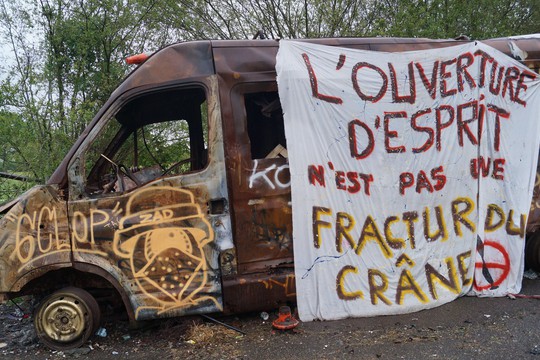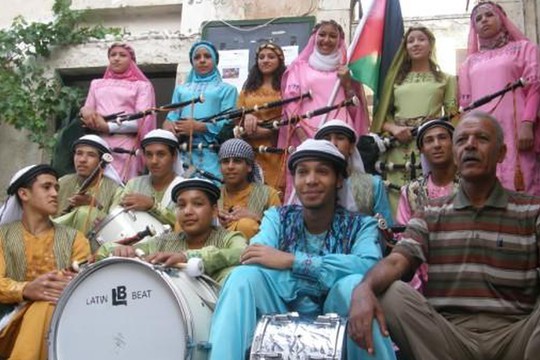Ethnomusicology in the age of immaterial labour
by Ed Emery
Aug. 20, 2018
A 2008 paper that examines the trade of the ethnomusicologist in the light of Antonio Negri's work on the common, and on immaterial labour. Moving towards a concept of "diasporic musicating subjects of resistance".

Ethnomusicology in the age of immaterial labour
by Ed Emery // August 20, 2018
Ethnomusicology in the Age of Immaterial Labour [2008]
Ed Emery [SOAS]
On 19 January 2008 Antonio Negri, co-author with Michael Hardt of the best-selling book Empire [Harvard, 2002], will speak at London’s Tate Modern on “Art and Immaterial Labour”. I take this as an opportunity to examine one or two of his concepts which seem to run parallel with matters of concern in ethnomusicology. Proceeding via brief vignettes of selected ethnomusicologists I also offer for consideration the notion of “the musicating subject” and locate this notion alongside the broader concept of immaterial labour.
Negri’s thesis is that within Empire (i.e. the new condition of sovereignty arising after the collapse of the Soviet Union) the power of invention has become the general and common condition of production, and that “immaterial labour” occupies an increasingly dominant position in the capitalist economy. Furthermore, “labour, in order to be creative, must be ‘common’, in other words produced by networks of cooperation”. [1] Labour is productive when it is free, otherwise it is dead, and it is free only when it is common. Significantly, in our present time the common character of productive cooperation is caught in a tug-of-war between the private and the public, between the right to private appropriation and the acknowledgment of its public socialisation.[2]
The material and the immaterial of “ethno” music
In the nineteenth century, the nascent ethnomusicology, mediated via academic institutions, occupied an interesting mid-position between ethnic source materials and eventual outputs into the music market. Using shorthand, we might say that, in the same way that the production and distribution of sheet music had been functional to the selling of pianos, so too the capture, recording and distribution of ethnic musics was functional to the selling of gramophones. An Oriental tune picked up in the field might transmute into “In a Persian Garden”, then to be sold in Woolworth’s for sixpence; thus something as quintessentially “immaterial” as the conjunction of tones in an Oriental maqam becomes material fact in shellac, and implies worldwide circuits of capital and labour engaged in its production.[3] Simultaneously the whole ethno-music industry enterprise was functional to nineteenth-century nationalist narratives arising out of nation-creating – and therefore the collection, archiving, distribution and performance of ethnic musics also has interesting relations with the state. Hence ethnomusicology, in some of its manifestations, can be read as existing simultaneously within a threefold nexus of industry, academe and state.
Exemplifying this nexus, in 1875 Louis-Albert Bourgault-Ducoudray, later professor of music history at the Paris Conservatoire, undertook four months of travel in Greece and Asia Minor to record songs which he then published as “Thirty Popular Melodies of the Orient”.[4] True to Hornbostel’s observation about the European musicologist’s “tendency to adjust everything that is unusual to fit our concepts and to hear exotic musics with European ears”,[5] Bourgault-Ducoudray dismissed “these bleating voices, that nasal singing, that monotone, that insipidness, that remorseless ison [drone] which has on an expressive melody the effect of a skewer passed through a human body”, and resolved to cure Eastern Orthodox music of “these intervals other than the tone and the half-tone, which most of the time are just wrong notes”.[6] He harmonised the songs that he collects, published them in an edition for piano and voice, and made two important observations: (a) the musical resources offered by the musics of the East could revive Western classical music, which he perceived as being stuck in a dead end; and (b) reforming the musical tastes of the East could open a market for the sale of pianos.[7] It is noteworthy that publication of his travel journal was funded by the French Ministry of Agriculture and Trade.
Béla Bartók’s 10-day song-research expedition to Turkey in 1936 was similarly located in the three-fold nexus of state, academe and industry. This research project validated the national song-collecting efforts of the newly-established Turkish Republic under Kemal Atatürk, fed into broader academic concerns about circulations of music (Old Hungarian and Old Turkish), and also fed immediately into the concert halls – thus the “limping” aksak rhythm which Bartók had identified (erroneously) as “Bulgarian” was used by the composer in his 5th String Quartet. With Bartók, however, what interests me more is to highlight the personal scale of his venture. In short, he was what I would call a “musicating subject”, or a “musicant”. He was not simply a musician, or composer, or transcriber, or archivist, or recording engineer. He was all of these things embodied in one single figure. As such he was a human rarity in his time. And in his time the conditions were not propitious for such “musicants” to flourish and prosper – far from it. Like Hornbostel before him, he was driven into the misery of exile by the rise of Nazism. I shall return to the “musicant” shortly.
Moving forward to our time, we have a similar nexus of industry, academe and state figured in the work of Lucy Durán of London’s School of Oriental and African Studies. Moving initially from a base at the National Sound Archive she has played an important role in creating the genre known as “World Music”. Collaboration with musician Peter Gabriel led to the establishment of the World Music and Dance (WOMAD) festival, and musical productions for Real World Records.[8] These initiatives now interweave in complex ways with the national broadcaster (BBC) in the form of regular radio programmes and the Radio 3 World Music Awards, which in turn set agendas and music performance standards back in the originating countries of the ethnic musics that are featured. By now, however, all this has become big business, a far cry from the abstruse and minority-interest researches of Bourgault-Ducoudray and Bartók. There is a world audience for the radio and TV programmes; there are associated products in the form of films and CDs (the film venture Long Way Down comes to mind); and the creation of “World Music” has become interactive, with internet sites, the listening public voting for favourite acts etc.
This is not to suggest that any of the principals in this operation are becoming rich on it, but merely to state that the characteristic nexus of industry, academe and state are operational in our time. More than this, however: the field in which they operate – the material manufacture and marketing of the immaterial – is part of a general massification of “immaterial production” in the world economy as a whole. For instance, when song-based ring tones for mobile phones bring the entertainment industry more than $3 billion in revenue in a year,[9] even the most sceptical observer might accept that the circulation and marketing of immaterial “bits and bytes” has the upper hand over the old metal-manipulating industries of auto, electrodomesticals etc.
The common and the “musicating subject”
The second set of Negrian concepts I wish to address are those summarised in the common, the free networks of cooperation and the contradiction with private appropriation. This is concisely addressed in the case of DJ Drama, a mixed-race rapper who was arrested in Atlanta, USA in January 2007 on music piracy charges relating to the production of “mixtapes”. These are recordings in which artists take musical material produced by other artists and record their own material over the top, sampling and cutting where necessary. In the early 1980s the now-global phenomenon of hip-hop was a marginal music of the streets. The technically illicit breach of copyright involved in this process was actively condoned by the recording industry, since this was the “mode of production” that created the stars whom they would subsequently sign up and market globally. In short, as one commentator puts it, “legal and bootleg recordings [have] been in artistic and marketing collusion for the past 20 years”.[10] This suggests a kind of “musical commons” in which the free circulation of material in “networks of cooperation” is a precondition of record-producing activity. For the industry, however, the contradiction periodically becomes too big, and the record companies decide to send in the police. Thus, to use Negrian terms, the common character of productive cooperation is caught in a tug-of-war between the right to private appropriation and the acknowledgment of its public socialisation.
This exemplary affirmation of how music happens “on the street” (one locus of the global music-making of the twenty-first century) is also useful in identifying the emergence of a new social subject – what I called earlier the “musicant”.
Developments in computers and digital and telecommunications technologies have created a historically unprecedented situation in which the isolated figure of Bartók-the-musicant (as musician, composer, transcriber, archivist and recording engineer) is recreated in what I would call “the massified musicating subject” – a figure who has been enabled and empowered by means of mobile phones, mp3 players, computer software, networking and peer-to-peer sharing. Here I recall a group of black kids standing on a London street corner one night, gathered round a mobile phone, which was sending out downloaded hip-hop rhythms over which they were improvising rap riffs. Where Bartók was singular, these young people are millions. Embryonically they embody the same musicant capacities as his, and they are present in all corners of the globe. They produce, transcribe, archivise, engineer, network and distribute their musics, and the dividing line between the researcher-observer and the practitioner-subject becomes interestingly confused.
Exemplifying Negri’s argument, today the entertainment industry is hugely concerned with immaterial objects of production. For instance in the field of artificial intelligence (AI) and the creation of video games, ontologies and metalanguages are now the daily fare of designers and coders. I would suggest that here we have an interesting confluence of discourse with recent ethnomusicological shifts in the direction of intangibles. Feld and Keil are a case in point, in their writing on “groove and style” [11] (what they define as “distilled essences, crystallizations of collaborative expectancies in time”, p. 109), or “the element in swing that resists analysis” (p. 59), or the nature of “communicational processes or transacted social meanings” in and through music (p. 81), or the relation between music and “speech about music” (pp. 77-95).
Conceptualising and capturing these elusive essences is in fact the stuff of postmodern immaterial production; here we can expect Sony and Time-Warner to be reading with interest..
The missing element in all the above, however, is that Negri conceives the new social subject as a figure not only of cooperation but also of resistance and the constitution of new social alternatives (not surprisingly, since he is a Marxist). Feld and Keil on the other hand characterise themselves more gently – as obsessive white male gramophonists with a social conscience.[12] But there is a point where all three merge with the voice of the rapper on the street. For Negri the new social subject within Empire has a constitutive potenza, a potential of subversive behaviours that create new world alternatives. For French rapper DJ Mars, “A rap album’s not like an album from a record company, it’s a street record. We’re in a whole different world here, in a little underground circuit.”[13] And from Keil and Feld we also hear a clarion call for contra-active constituent behaviours:
“Yeah. And the rappers and the dubbers are in the spirit of the Diggers and the Levelers and Ranters […] It’s all people getting up and acting out and saying we won’t take it any more. [..] Ranting and raving! We need that shit!”[14]
Whether or not this should be an operational programme for ethnomusicology in the age of immaterial labour I leave to the reader to decide.
London – January 2008
NOTES
- Antonio Negri, Reflections on “Empire”, Polity Press, Cambridge, January 2008, p. 63.
- Op. cit. p. 120.
- Liza Lehmann, “In a Persian Garden”, Gramophone Company, 1916, D449-51.
< http://www.webrarian.co.uk/music/persian_garden.html >. [Accessed 1.i.08] - Louis-Albert Bourgault-Ducoudray, Trente Mélodies Populaires de Grèce et d’Orient, Henry Lemoine, Paris, 1876.
- Erich von Hornbostel,Opera Omnia, ed. Klaus Wachsmann, Dieter Christensen and Hans-Peter Reinecke, Martinus Nijhoff, Hague, 1975, vol. 1, p. 251.
- “L’habitude que les musiciens ont contracté des intervalles autre que le ton et le demi-ton…” Louis-Albert Bourgault-Ducoudray, Études sur la musique ecclésiastique grecque: Mission musicale en Grèce et en Orient – Janvier-Mai 1875, Hachette, Paris, 1877, p. 5.
- Op. cit., pp. 63-4.
- For instance the Cuban music CD La Explosión del Momento, Orquesta Revé, Real World, 1989, R 127639; see also http://www.bbc.co.uk/radio3/presenters/lucy_duran.shtml. [Accessed 1.i.08]
- Charles Duhigg, “EMI profits up 14%”, Los Angeles Times, 24 May 2006.
- Thomas Blondeau, “The mixtape mistake: friendly pirates of rap”, Le Monde diplomatique [English edition], January 2008. < http://mondediplo.com/2008/01/18mixtapes> [Accessed 1.i.08]
- Charles Keil and Steven Feld, Music Grooves, University of Chicago Press, Chicago, 1994.
- Keil and Feld, op. cit., pp. 5-6.
- Blondeau, op. cit.
- Keil and Feld, op. cit., p. 235.
author
Ed Emery
other posts

May Day at the ZAD - Notre Dame des Landes - 1 May 2018
by Ed Emery / Aug. 13, 2018

